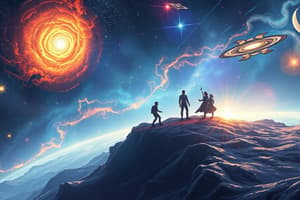Podcast
Questions and Answers
What scientific subtopics are focused on in the text?
What scientific subtopics are focused on in the text?
- The Expansion of the Universe
- Planets and Stars
- Astronomical Discoveries
- The Cosmos and The Big Bang (correct)
Who first proposed the concept of the expansion of the universe?
Who first proposed the concept of the expansion of the universe?
- Isaac Newton
- Edwin Hubble (correct)
- Georges Lemaître
- Albert Einstein
Which theory suggests that the universe emerged from an infinitely hot, dense singularity?
Which theory suggests that the universe emerged from an infinitely hot, dense singularity?
- Quantum Mechanics
- Newton's Law of Gravity
- Theory of Relativity
- The Big Bang Theory (correct)
What phenomenon did Edwin Hubble use to demonstrate the expansion of the universe?
What phenomenon did Edwin Hubble use to demonstrate the expansion of the universe?
Which mathematical model helps in studying and understanding the cosmos?
Which mathematical model helps in studying and understanding the cosmos?
What does the redshift of light from distant galaxies indicate?
What does the redshift of light from distant galaxies indicate?
What are dark matter and dark energy?
What are dark matter and dark energy?
Which scientific method is fundamental to our understanding of the cosmos?
Which scientific method is fundamental to our understanding of the cosmos?
What does the Standard Model of Cosmology consider the universe to be?
What does the Standard Model of Cosmology consider the universe to be?
What percentage of the universe is believed to be dark energy?
What percentage of the universe is believed to be dark energy?
Which field focuses on the observation and measurement of celestial objects?
Which field focuses on the observation and measurement of celestial objects?
What has allowed scientists to make inroads into the mysteries of the universe?
What has allowed scientists to make inroads into the mysteries of the universe?
Flashcards are hidden until you start studying
Study Notes
Discovering Our Universe: A Scientific Journey
As we embark on an exploration of our universe's vast expanse, we'll be diving into the scientific discoveries that have shaped our understanding of this awe-inspiring cosmos. Our focus will be on the scientific subtopics that have contributed to this knowledge, shedding light on the inner workings of the universe and our place within it.
The Cosmos
The universe is a continuously expanding, dynamic entity, filled with a variety of celestial objects. These include stars, galaxies, planets, and countless other phenomena. Science provides us with a framework to study and understand the cosmos, equipped with tools such as telescopes, spacecraft, and elaborate mathematical models.
The Expansion of the Universe
One of the most remarkable discoveries in modern astronomy is the expansion of the universe, as first proposed by Edwin Hubble in 1929. Using the Doppler effect, Hubble demonstrated that the light from distant galaxies is redshifted, indicating that the universe is expanding. This discovery led to the development of the Big Bang Theory, one of the most widely accepted models of the universe's origin.
The Big Bang
The Big Bang Theory, first proposed in 1927 by Georges Lemaître, suggests that the universe emerged from an infinitely hot, infinitely dense singularity approximately 13.8 billion years ago. Since then, the universe has been expanding and cooling, giving rise to the stars, galaxies, and everything we observe today.
The Standard Model of Cosmology
The Standard Model of Cosmology is a framework that describes the observable universe, including its evolution and composition. The model is a synthesis of various theories, including the Big Bang Theory, the Standard Model of Particle Physics, and the Cosmological Principle. The Standard Model considers the universe to be expanding, homogeneous, and isotropic, but also includes dark matter and dark energy.
Dark Matter and Dark Energy
Dark matter and dark energy are fundamental components of the universe, yet they are undetectable through the electromagnetic spectrum. Dark matter, first proposed in the 1930s, is believed to comprise about 27% of the universe, holding galaxies together and contributing to the universe's gravitational pull. Dark energy, on the other hand, makes up an estimated 68% of the universe and drives its accelerated expansion.
Astronomy and Astrophysics
Astronomy and astrophysics are interdisciplinary fields that employ a wide variety of scientific methods to study the universe. Astronomy, as the oldest science, focuses on the observation and measurement of celestial objects, while astrophysics uses physics principles and theories to explain the behavior of these objects. The fields have grown increasingly intertwined over the centuries, fostering a deeper understanding of our universe.
The Scientific Method
Ultimately, the scientific process is fundamental to our understanding of the cosmos. The scientific method, comprising observation, hypothesis, experimentation, and evaluation, has allowed scientists to make inroads into the mysteries of the universe. By continuing to employ this method, we can continue to uncover the secrets of the cosmos and refine our understanding of the universe.
Conclusion
As we've explored the cosmos through science, we've uncovered a multitude of fascinating discoveries that have shaped our understanding of the universe. By embracing the scientific method and building upon our past work, we can continue to expand our knowledge and make new discoveries that reveal the wonders of our universe.
Studying That Suits You
Use AI to generate personalized quizzes and flashcards to suit your learning preferences.




